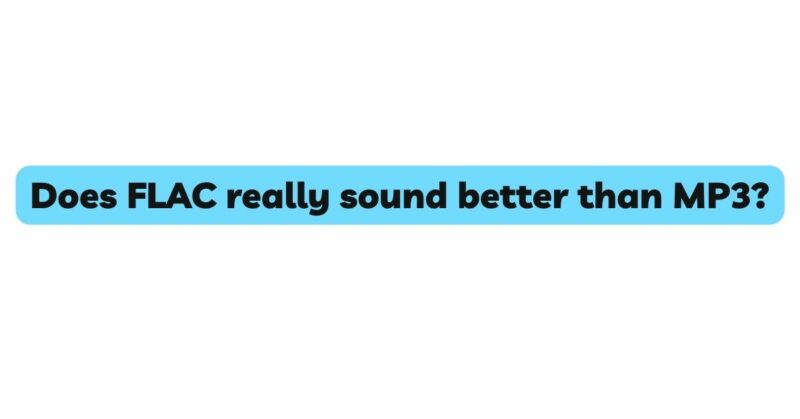In the digital age of music consumption, the pursuit of the purest and most faithful audio reproduction has given birth to numerous debates among audiophiles and music enthusiasts. Among these discussions, the showdown between FLAC (Free Lossless Audio Codec) and MP3 (MPEG Audio Layer III) formats stands out prominently. FLAC loyalists ardently claim that its lossless compression offers unparalleled audio quality, while proponents of the ubiquitous MP3 format argue that the human ear can hardly distinguish the perceived superiority of FLAC. This article delves deep into the scientific, perceptual, and practical aspects of the FLAC vs. MP3 debate, aiming to shed light on whether FLAC genuinely sounds better than its compressed counterpart.
Decoding the Formats: FLAC and MP3
Before exploring the sonic disparities, it’s essential to grasp the technical foundations of both formats. FLAC employs lossless compression, meticulously preserving the entire audio spectrum without compromising quality. This means that FLAC files store all original audio data, allowing for perfect reconstruction during playback. MP3, on the other hand, employs lossy compression, selectively discarding audio information that is supposedly less noticeable to the human ear. This reduction in data size results in smaller file sizes but potentially sacrifices subtle audio nuances.
The Science Behind Sound Perception
Human perception of sound quality is an intricate blend of biology, psychology, and personal preference. Our auditory system can distinguish a broad range of frequencies and dynamics, yet the challenge lies in discerning whether the differences in audio quality between FLAC and MP3 are perceptually significant.
Studies by researchers such as Joshua Reiss at Queen Mary University of London have demonstrated that while audiophiles and trained listeners might discern variations between FLAC and MP3, the average listener often struggles to consistently differentiate between the two formats in blind listening tests. This suggests that the perceptible advantage of FLAC might be more elusive in real-world listening environments.
Bit Rates and Compression Artifacts
Bit rate plays a pivotal role in the sound quality of compressed audio formats like MP3. Higher bit rates typically result in better audio quality but at the cost of larger file sizes. However, it’s crucial to note that higher bit rates don’t entirely eliminate compression artifacts, which are sonic imperfections introduced during the encoding process. These artifacts, such as pre-echo and post-echo, might be more noticeable in lower bit rate MP3 files, potentially affecting audio fidelity.
Equipment and Listening Environment
The playback equipment and listening environment further complicate the FLAC vs. MP3 debate. High-quality headphones or speakers, coupled with an acoustically optimized room, might reveal nuances in FLAC files that MP3 might struggle to reproduce. However, for most casual listeners using standard consumer devices in non-optimal settings, the distinctions between FLAC and MP3 might be negligible.
Subjectivity and Confirmation Bias
Human perception of audio quality is innately subjective. Factors such as individual preferences, musical familiarity, and expectations heavily influence how listeners perceive sound. The confirmation bias, where individuals believe that FLAC should sound superior due to its reputation, can lead to a psychological predisposition to favor FLAC in blind listening tests. This bias underlines the challenges of conducting impartial experiments to assess the true difference in audio quality.
The Pragmatic Perspective
While FLAC may offer a perceptible advantage in certain scenarios, the practical implications of adopting it over MP3 cannot be overlooked. FLAC files are significantly larger than MP3 files, demanding more storage space and potentially causing compatibility issues with older devices or streaming platforms. This trade-off between superior audio quality and convenience underscores the importance of striking a balance between audiophile aspirations and real-world constraints.
Conclusion: The Quest for Sonic Purity Continues
In the quest for audio nirvana, the FLAC vs. MP3 debate presents a multi-dimensional landscape where technology, perception, and pragmatism converge. While FLAC’s lossless compression indeed upholds the original sonic integrity, the extent to which the human ear can discern its superiority over MP3 remains a matter of contention. Audiophiles equipped with high-end gear and acoustically treated listening spaces might relish the subtle nuances of FLAC, but the everyday listener might struggle to distinguish these subtleties.
Ultimately, the choice between FLAC and MP3 hinges on personal priorities. For purists seeking the utmost fidelity and archival value, FLAC might be the ideal choice. For the average listener seeking a compromise between audio quality and practicality, MP3’s ubiquitous compatibility and smaller file sizes might suffice. The FLAC vs. MP3 debate unveils not only the complexities of human perception but also the evolving landscape of music consumption, where art and science harmonize in a symphony of sound exploration.


